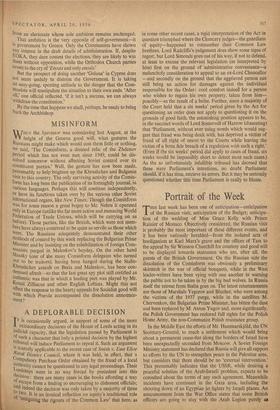A DEPLORABLE DECISION
T is occasionally argued, in support of some of the more extraordinary decisions of the House of Lords acting in its judicial capacity, that the legislation passed by Parliament is of such a character that only a pointed decision by the highest tribunal will induce Parliament to repeal it. Such an argument is scarcely applicable to the recent case of Smith v. East Elloe Rural District Council, where it was held, in effect, that a Compulsory Purchase Order obtained by the fraud of a local authority cannot be questioned in any legal proceedings. Their Lordships were in no way forced by precedent into this decision : there are many cases in the books affording a way of escape from a finding so encouraging to dishonest officials; and indeed the decision was only taken by a majority of three to two It is an ironical reflection on equity's traditional role °f 'mitigating the rigours of the Common Law' that here, as in some other recent cases, a rigid interpretation of the Act in question triumphed where the Chancery judges—the guardians of cquity—happened to outnumber their Common Law brethren. Lord Radcliffe's judgement does show some signs of regret; but Lord Simonds goes out of his way, if not to defend, at least to excuse the relevant legislation (as interpreted by him) first on the ground of administrative convenience—a melancholy consideration to appeal to an ex-Lord Chancellor —and secondly on the ground that the aggrieved person can still bring an action for damages against the individual responsible for the Order: cool comfort indeed for a person who wishes to regain his own property, taken from him- possibly—as the result of a bribe. Further, since a majority of the Court held that a six weeks' period given by the Act for questioning an order does not apply to questioning it on the grounds of good faith, the astonishing position appears to be, in the succinct words of Lord Somervell of Harrow (dissenting) that 'Parliament, without ever using words which would sug- gest that fraud was being dealt with, has deprived a victim of fraud of all right of resort to the Courts while leaving the victim of a bona fide breach of a regulation with such a right.' (Even if the six weeks' period did apply to cases of fraud, six weeks would be impossibly short to detect most such cases.). As the so unfortunately infallible tribunal has decreed that these were Parliament's intentions, no doubt Parliament should, if it has time, retrieve its errors. But it may be seriously questioned whether this time Parliament is really to blame.


















































 Previous page
Previous page